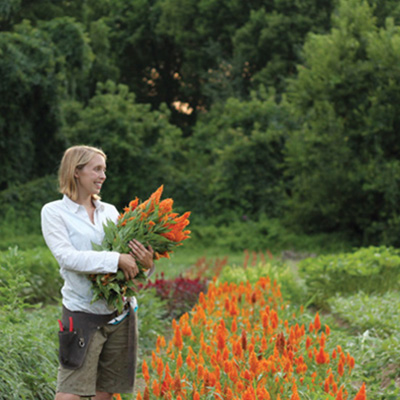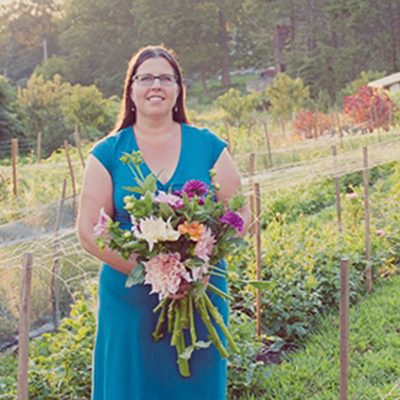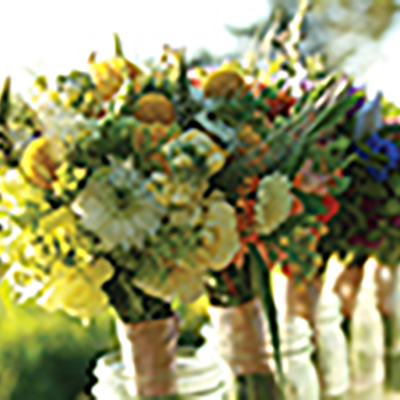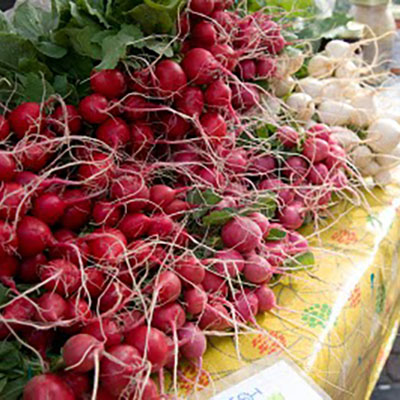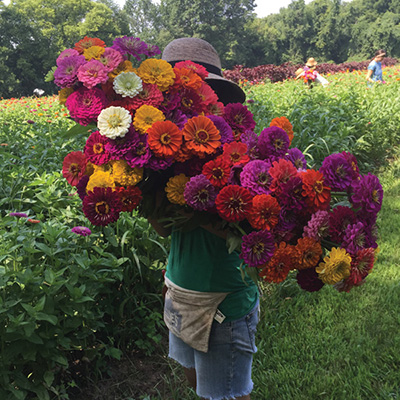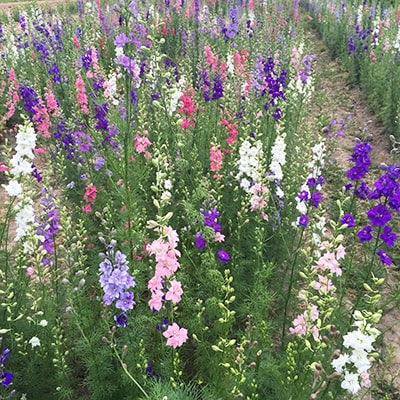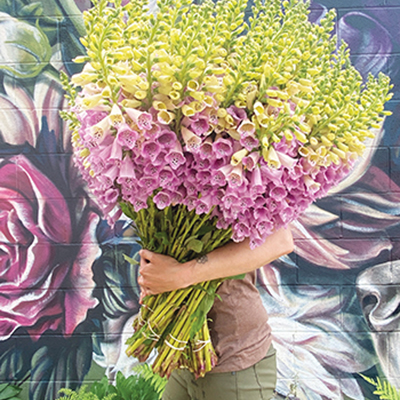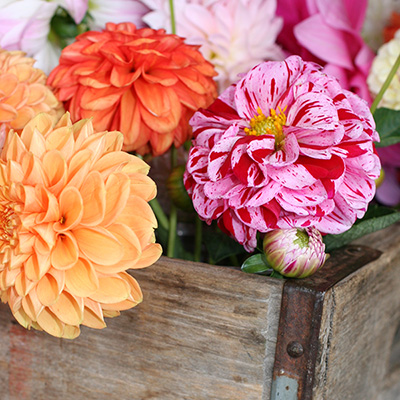A simple label can be the most effective- and affordable- marketing tool for your flowers
More than two decades ago, just in time for their second flower delivery to Central Market, the upscale emporium owned by Texas grocery giant HEB, Pamela and Frank Arnosky ordered stickers that read: “Texas Garden Bouquet” and “Fresh from the Texas Hill Country.”
Fast forward to 2017 and tens of thousands of beautiful bouquets produced each year by the Arnoskys at Texas Specialty Cut Flowers in Blanco, Texas, are still sleeved, labeled and delivered to Central Market, Whole Foods, and other grocery chains across the Lone Star State.
The Arnoskys were some of the first - and best - to brand their specialty cut flowers with a regional message. “If you want to be customer-driven, you have to brand your flowers,” Pamela insists.
Yes, there is a cost and yes, it requires more labor. But labeling campaigns and branding programs have a big impact with consumers, say flower farmers across the U.S.
So when, where, why and how does it make sense to slap a “local” label on your blooms? Here’s a round-up of advice to guide you.
Below, bouquets from Texas Specialty Cut Flowers in sleeves branded with “Fresh from the Texas Hill Country” and the Certified American Grown logo.
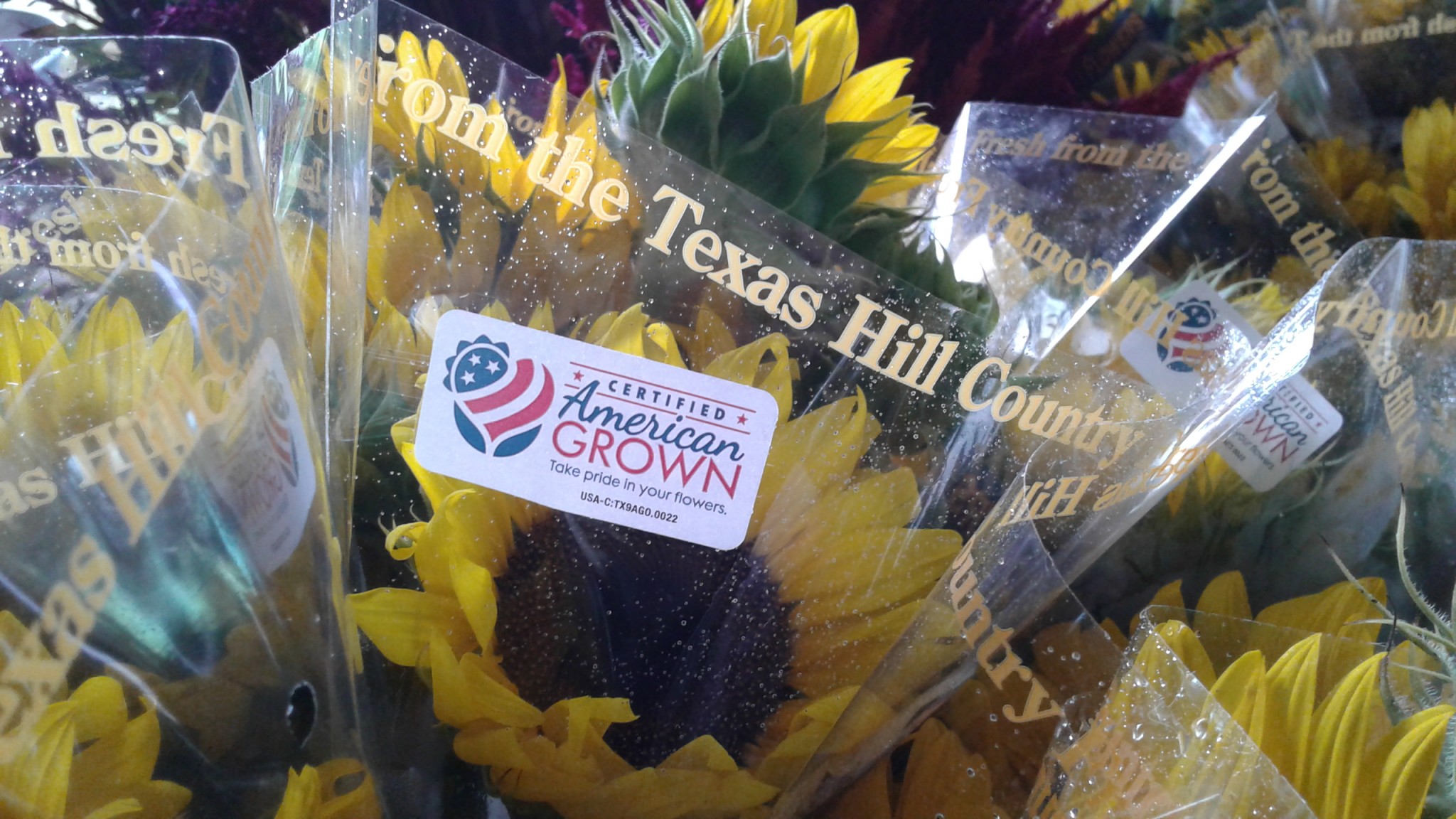
Partner with an established brand
Nicolette Irving owns Flourish Flower Farm in Asheville, N.C. Among other channels, she sells her bouquets through two local branches of Earth Fare, a regional chain that stretches from Michigan to Florida. “The branding for my business is unique because I’ve co-branded with the Appalachian Sustainable Agriculture Project (ASAP),” Nicolette says.
“I became Certified Appalachian Grown as soon as I launched my business, knowing that conscious consumers in our area recognize and trust the ASAP logo. Becoming a certified partner has given my business a legitimacy and connection to a well-established local food and farm advocacy organization.”
Flourish Flower Farm’s logotype and the tagline “Mountain Fresh Flowers, Asheville, N.C.” are paired with Appalachian Grown’s badge. Nicolette uses that combined logo on her farm’s web site and on labeling for grocery and CSA bouquets.
Co-branding also helps customers recognize that Flourish’s bouquets are locally grown. The chance to align with other Appalachian-Grown farm products also allows Nicolette and Flourish to benefit from the marketing efforts of all regional producers in western North Carolina and Appalachia, she says.
Below is the logo for Flourish Flower Farm, incorporating the Certified Appalachian Grown logo.
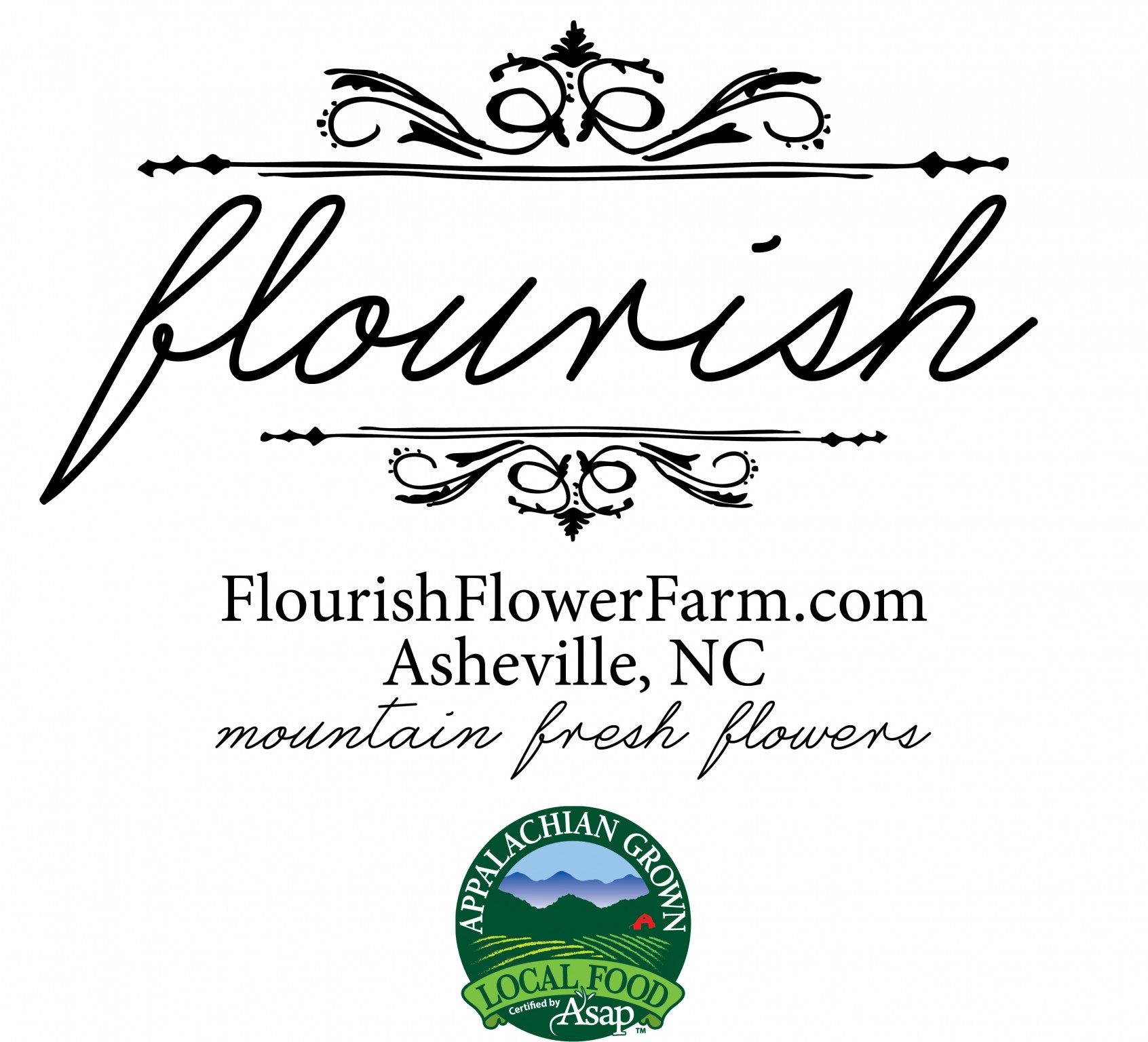
Certified American Grown branding is another option, one used by the Arnoskys at Texas Specialty Cut Flowers in conjunction with their own blue-barn logo. The Certified American Grown program was formed in 2014 by a coalition of flower farms large and small, with seed funding from several state and national flower farming groups. Today, there are more than 50 farms in 16 states enrolled. The red-white-and-blue “Certified American Grown” logo helps to brand millions of stems of flowers annually, including those at retail and wholesale outlets.
At Oxford, Michigan-based Summer Dreams Farm, started by Michael Genovese in 2015, the decision to become a Certified American Grown member made sense, even though his operation is young and relatively small, with approximately 22,000 dahlias in production.
Michael feels an affinity for the American-grown branding. “I grew up in agriculture on a tree farm and our family were always members of the Michigan Christmas Tree Growers Association, so I recognized early on the importance of being part of a larger organization.”
The Summer Dreams Farm logo appears alongside the Certified American Grown logo on Michael’s web site and business cards. As he expands distribution to other Midwest markets, he hopes to use similar labeling on his products. “Right now, the majority of people who buy my dahlias know they are coming from me - and that’s because of my activity on Facebook and Instagram and because my farm’s name is on display at the Farmer’s Market.”
Michael’s tagline is “a specialty flower farm” and he currently doesn’t label flowers at the Downtown Rochester Farmers’ Market or those sold direct to florists - since he personally delivers those blooms to people who already know his story. Plum Market, a regional chain, uses point-of-purchase signage to inform shoppers that Summer Dreams Farm’s dahlias are locally-grown. The staff at Mayesh Detroit, Michael’s main wholesale customer, are familiar with him and his story, which they often share with customers. Both channels present future labeling opportunities, he says.
Below is the logo for Erika's Fresh Flowers that is used on stickers and other branding materials.
 (2).jpg)
Tell your story on a two-inch billboard
The best way to get started with your own labeling program is to invest in logo development and craft a punchy tag, say savvy flower farms. I spoke with three farms in various regions of the U.S. to learn that you can brand your flowers for a few hundred dollars.
Kathleen Barber, a farmer-florist who owns Erika’s Fresh Flowers in Warrenton, Oregon, has been growing and selling flowers for more than a decade. Her business began as honor-system roadside flower stand and now supplies destination weddings along the Oregon coast, local business and CSA subscribers and the Astoria Co-op Grocery. “At some point, I knew I needed a proper label. I found a logo designer on Etsy and my daughter came up with our tagline - ‘local, garden-style, wild-inspired’ - which appears along with our web site and location.”
Kathleen wraps individual bouquets in 18-by-18-inch Kraft paper and seals each with the round 2-inch label depicting a teal blue poppy and her tagline. “I think having the nice label is part of my brand and people like buying a package that looks good.”
The well-labeled bouquets stimulate business beyond the grocery store. For example, Kathleen tucks a small business card into each bouquet that advertises her CSA subscription program. Astoria Co-op also features Erika’s Fresh Flowers on its web site and has point-of-purchase signage featuring Kathleen’s photograph and contact information.
Below, a sticker with the the logo for Erika's Fresh Flowers is on every bouquet she sells, and a business card advertising her CSA program is tucked inside.
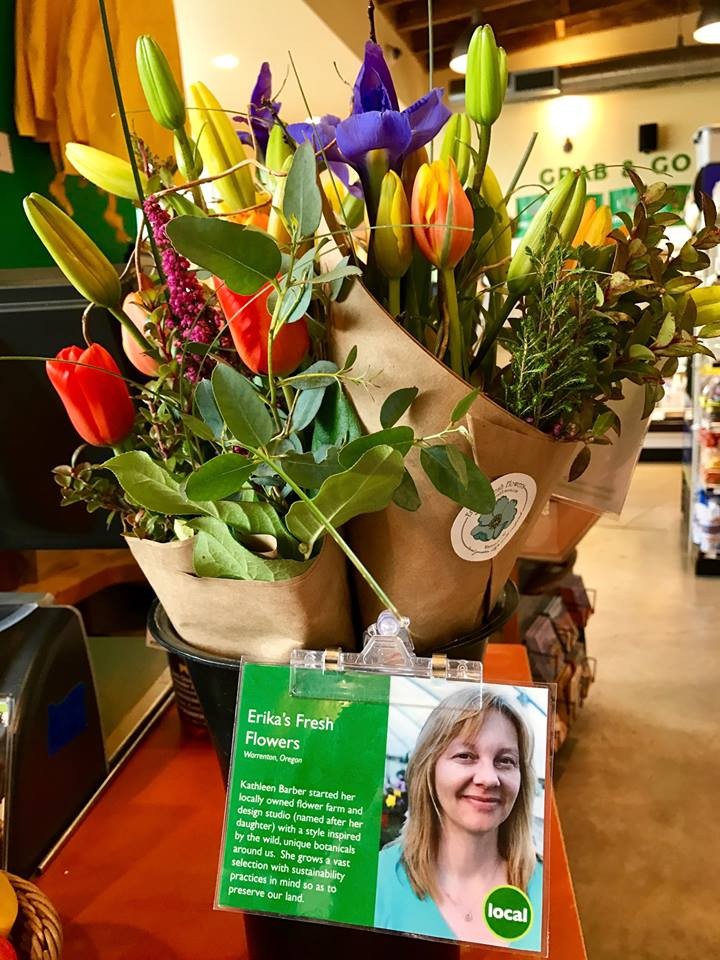
In Winterset, Iowa, flowers from Adam and Jennifer O’Neal’s PepperHarrow Farm are branded with a playful illustration of a cow, beehive and bees surrounded by a ring of flowers that reads “locally grown, specialty cut flowers,” along with the farm’s web site and hometown name.
The couple created the label in 2014 with Iowa artist Amy Koenig who had previously illustrated a poster to advertise PepperHarrow’s annual Yoga on the Farm event. The artist talked with both Adam and Jennifer and spent time looking at their respective Instagram feeds to get a sense of their personalities. “I wanted the logo to not just be about flowers, but to be about the farm experience,” Adam explains.
PepperHarrow’s bouquets are sold at Gateway Market in Des Moines, Iowa, and Hy-Vee stores in Central Iowa. “Putting our branding on our grocery bouquets has brought so much direct business to us, so much recognition in the marketplace, including brides coming to us looking for flowers. It was the best thing we could have ever done,” Jennifer says.
The couple hasn’t used the labeling at the Madison County Farmers’ Market, where they live and are well known. But with plans to bring flowers to the Downtown Farmers’ Market in Des Moines, Iowa, for 2017, Jennifer thinks the labels will be an essential branding tool. “It’s an added cost to label our flowers, but it will help us be more recognizable. We hope the brand connects with grocery customers in Des Moines who will also see our flowers at the farmers’ market.”
Below is PepperHarrow Farm's logo on a tag, sticker and business card.
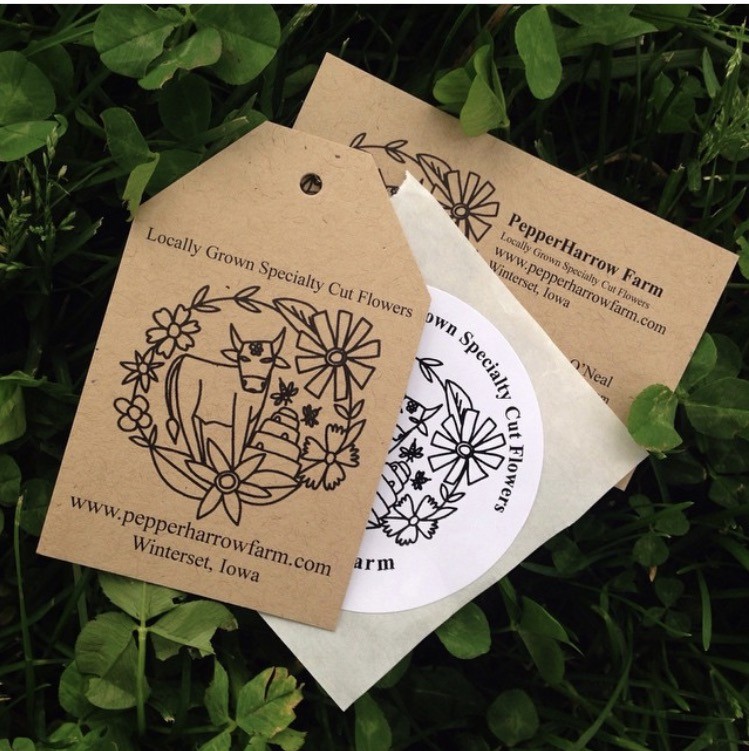
In Weyers Cave, Virginia, in the heart of the Shenandoah Valley, daughter-and-mom team Jessica Hall and Chris Auville run Harmony Harvest Farm, a family cut flower farm that supplies Whole Foods outlets in Charlottesville and Richmond. When they established the relationship with Whole Foods, their labeling was essential, says Jessica.
“Every flower that leaves our farm or goes through our grocery account features our logo,” she says. The logo reads: “Farm Fresh Flowers. Grown Locally With Love. Follow Our Journey at harmonyharvestfarm.com.”
Directing customers back to the farm’s website and blog is key to developing brand loyalty, Jessica explains. “It used to be that you had an elevator speech, but we don’t even have that much time. We’re lucky to get a passing glance. So the challenge is: how much information can you translate for the customer on a logo? That’s our brand identity.”
It’s not enough, though, to rely on a logo or brand to reach today’s tech-savvy customer, she adds. “You have to build the demand backwards through newsletters, blogging, word-of-mouth and social media.”
Be open to change
In its sixth year, the Seattle Wholesale Growers Market (SWGM), a farmer-owned cooperative, enjoys strong brand recognition among retailers, florists, and event and wedding designers. SWGM currently supplies Town & Country Markets, a regional grocery chain, with Pacific Northwest-grown flowers bearing the “Seattle Wholesale Growers Market” logo.
But it took some trial and error with an earlier logo before the SWGM board and staff realized how strong their brand really was.
In 2013, the young cooperative received USDA Specialty Crop Block Grant funding to develop a mass market grocery program for local flowers. At the time, according to board president Diane Szukovathy, co-owner of Jello Mold Farm in Mt. Vernon, Washington, there was an urgency to develop distinct local branding for Pacific Northwest flowers due to the level of green-washing in the grocery marketplace.
SWGM earmarked some of the USDA funding to develop “By the Bunch,” a logo with orange-and-pink artwork featuring friendly faces of farmers and the tagline: “Farmer Owned. Northwest Grown.” That logo appeared on hangtags and sleeves for all of SWGM’s bouquets with flowers and foliages from member farms during 2013. Yet after just one season, “By the Bunch” was retired.
“Originally, we made a judgment call that the Seattle Wholesale Growers Market logo didn’t look ‘grocery acceptable’ enough,” Diane explains. “I think that was a mistake, actually. What we didn’t understand was that having the word ‘Seattle’ in our name for selling in Seattle grocery stores was plenty fine.”
With support from the state’s USDA grant funders, the grocery program returned to SWGM’s original black-and-white graphics. Today, the SWGM logo is prominently used by Town & Country for in-store floral department signage and on the grocery chain’s web site.
Molly Sadowsky, a veteran of grocery floral who now manages the SWGM, says the word “Seattle” is one key reason for the brand’s success. “That geographic locator is most helpful,” she says.
Below is the logo the Seattle Wholesale Growers Market uses today.
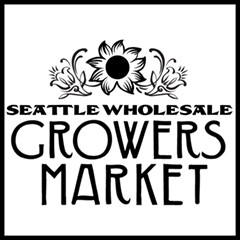
Four years later, no one in the marketplace even remembers “By the Bunch,” but they instantly recognize the SWGM logo, adds Diane. “We learned that our best customer is the discerning grocery customer who is looking for the real deal, not green-washing. Our simpler logo comes off as more authentic.”
Pamela Arnosky, of Texas Specialty Cut Flowers, can’t say enough about the power of branding. “Branding is just part of standardizing what you produce so you’re consistent. You can’t always be there personally selling your flowers to the customer. But your label - and your quality flowers - can be.”
Debra Prinzing is a Seattle-based author of Slow Flowers and creator of Slowflowers.com.
For more by Debra, read The 50 Mile Bouquet, available from Growing for Market.
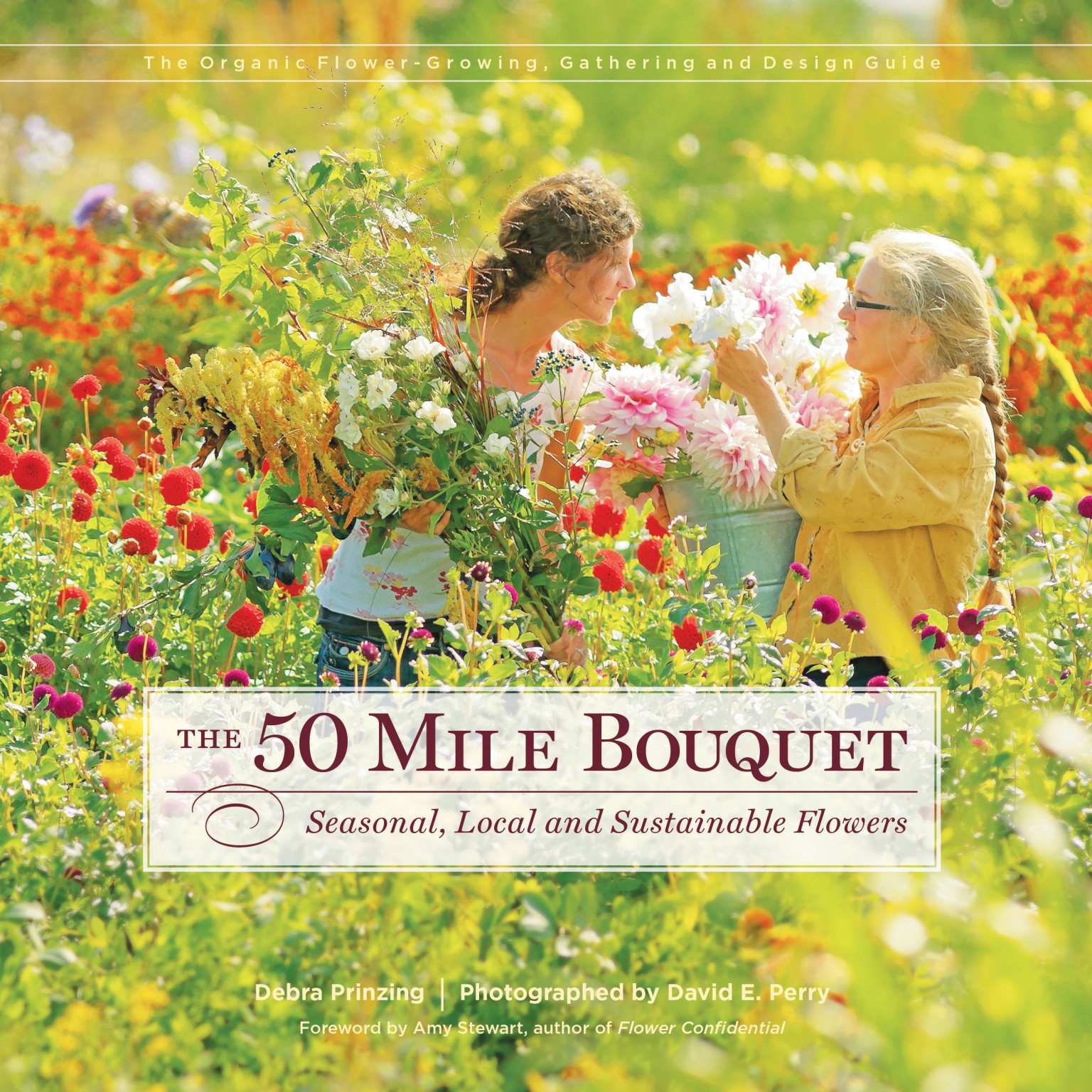

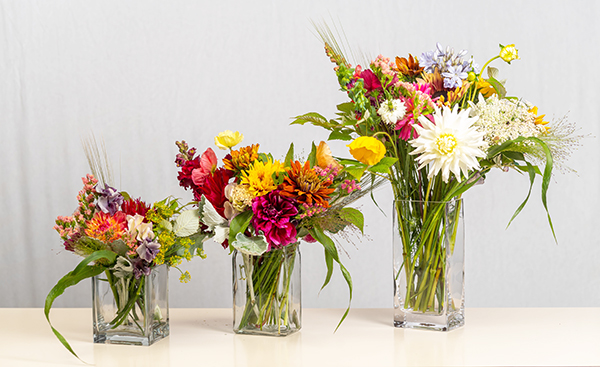 For most established growers, the easiest place to start selling flowers will be mixed bouquets and single stem/small bunch retail sales. These are the flowers you can sell to your existing customers and they are easy to incorporate into farmers market, CSA, and grocery sales. But there are lots of other outlets out there, including florists, weddings and events, business subscriptions, value added products, and wholesalers.
For most established growers, the easiest place to start selling flowers will be mixed bouquets and single stem/small bunch retail sales. These are the flowers you can sell to your existing customers and they are easy to incorporate into farmers market, CSA, and grocery sales. But there are lots of other outlets out there, including florists, weddings and events, business subscriptions, value added products, and wholesalers.
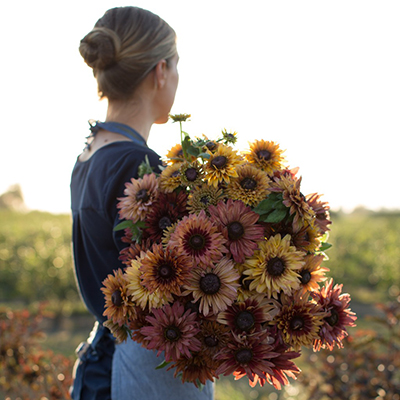
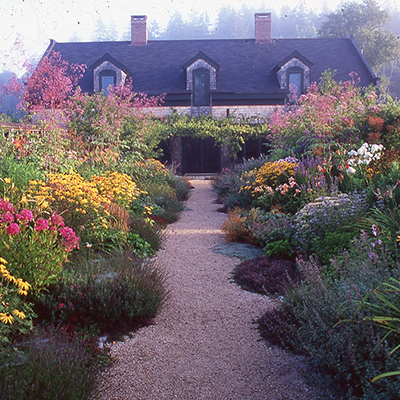
 Since its founding in 1968 by my husband Eliot Coleman, Four Season Farm has sought to produce the best vegetables possible, using soil-based organic methods, on a small amount of land. When I showed up in 1991, Eliot had begun to pioneer winter vegetable production, and I was delighted to give up the landscape design business I’d run in Connecticut and grow veggies with him. Then, about 10 years ago, flowers started to creep in.
Since its founding in 1968 by my husband Eliot Coleman, Four Season Farm has sought to produce the best vegetables possible, using soil-based organic methods, on a small amount of land. When I showed up in 1991, Eliot had begun to pioneer winter vegetable production, and I was delighted to give up the landscape design business I’d run in Connecticut and grow veggies with him. Then, about 10 years ago, flowers started to creep in.